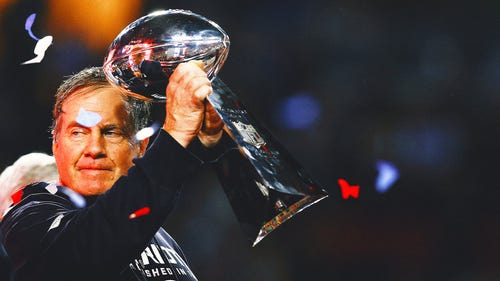
The uncommon trait that drove Tom Brady, Michael Jordan and Barry Bonds to greatness
Skip Bayless reflects on three of the greatest athletes he's covered over the course of his career, and considers the similarities and traits they share in an interview with Dieter Kurtenbach.
I’ve had the blessing and the honor to cover Michael Jordan and Barry Bonds and to closely observe Tom Brady through the eyes of several who are very close to him.
And what I find runs through each of those all-time greats is a channeled rage to win.
Rage.
R-A-G-E.
They all burn and yearn to conquer. It’s unlike anything I’ve ever experienced.
It manifests itself in different ways, so it’s hard to see it with the naked eye on a day-to-day and night-to-night basis, but if you want to call it the killer in them, the assassin in them, they all share that trait.
Whatever that anger is. Whatever that borderline uncontrollable passion is. All three were able to channel and focus under the highest pressure.

Michael Jordan was the ultimate — six Finals, six rings, six MVPs — and he invented slights on the part of opponents to motivate himself. He was always mad at something or somebody for something that seemed inconsequential to me.
One night, the Bulls in their final run in Chicago — 1998 — playing a best-of-five against the New Jersey Nets, and they had to play Game 3 at that dump in the Meadowlands.
The coach of the Nets was one John Calipari.
Michael went off on the Nets that night — 38 points, made almost everything he shot. I was sitting courtside on press row and I started to notice that as Michael came back down the court after scoring, he’d stare down and make faces and point at Calipari.
I thought to myself — what does he have against John Calipari? Where did this feud start?
I went into the locker room after the game and waited until it cleared out and asked him — for some reason I cannot explain, he always liked me and I was able to get him to open up at times — "where did this feud emanate from?"
He looked at me and said "I don’t have any feud with him. I just don’t like the way he acts."
Acts, how?
"He’s always pacing in front of his bench, he’s always strutting and grandstanding."
It offended him, and he wanted to put Calipari his place.
It stunned me. It was the ultimate artificial rift. It was pretty shallow. It was pretty weak. But it worked. Michael needed to anger himself. It was what he needed to light that fire inside.

I didn’t get along with Barry Bonds. He didn’t like me, but I loved him as a player.
He’s the greatest player I ever watched. I’m sorry if that offends people, but it’s the truth.
Did he get big and break the rules? Yep, he did. But I believe he did it in response to McGwire and Sosa — that summer of love in 1998.
But don’t forget that before that, he won eight Gold Gloves and hit a bunch of home runs. He was already a Hall of Famer before 2001.
The Barry I observed closely for that year was always angry at somebody — mostly the media.
He thought that we were out to get him, that we were bad people. That we didn’t give him enough credit.
It’s a shame, because if you ever caught him in a rare good mood, he might have been the best interview of my career.
But it was that anger towards the media that motivated him.
One night at Pac Bell — now AT&T Park — I was in the back row of a Jeff Kent scrum, trying to hear what Bonds’ teammate and rival was saying. Teammate and rival — that’s Bonds in a nutshell.
Bonds comes up behind me — he must have not liked something I wrote — and he grabbed with a vice grip around my arm.
He’s grabbing it tightly and he did this for at least a minute. It seemed like an hour.
He didn’t say anything.
He was channeling that rage at me, just like he would when the game was on the line.
In those moments, he was able to focus it all on that pitch — he’d only get one or two strikes a night, it seemed — but when he got one, he made that pitcher pay. There was no better clutch hitter with the game on the line.

Tom Brady is the nicest guy. Some people think he might be the nicest guy in the history of the world.
The ex-players, the analysts we have on Undisputed, they don’t buy it. Too good to be true. He’s not real to them. He’s an act.
He’s not their view of what a franchise quarterback should be, but I always fire back at them: What happens in the biggest games on the biggest stages? He turns into what I call "Psycho Tom."
He loses it in ways that no other quarterback has lost it emotionally on the field.
He’s angry at something or somebody. He’s going to go out and kick the world’s behind.
That’s how he plays — with a rage that shocks me. Nobody seems to pick up on it because they can’t figure out who’s the real guy.
Psycho Tom — that’s the real guy.
You think I’m never going to make it because I ran a funky 40-yard dash and selected in the sixth round? Watch this.
He wasn’t born with the most ability, but he overcomes his lack of physical traits with a drive that I have never seen in any quarterback, ever.
When that fire goes out, he’ll go away. But that fire is still burning because this commissioner, in my humble estimation, attempted to frame and railroad him and wrongfully conflict him in the court of public opinion, just to get even with the Patriots.
He re-lit a bonfire under Tom Brady.
It angers him, and I know from his close friends, he’s playing with that rage this year. He’s going to get even with Roger Goodell. He could have done it in court, but he ran out of time, so he’s doing it on the field.
Instead of fading away at age 39, he channeled all of that rage, just like Jordan with the fake slights or Bonds with the media. You saw the results this year.
On Sunday, you’re going to see Psycho Tom one more time, because you always do.










